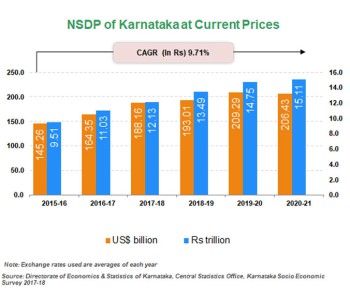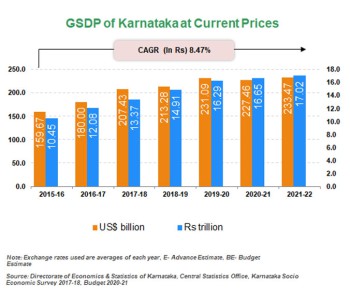INTRODUCTION
Karnataka is located in the south of India. It is surrounded by the Arabian Sea on the west, Goa on the northwest, Maharashtra on the north, Andhra Pradesh on the east, Tamil Nadu on the southeast, and Kerala on the southwest.
At current prices, Karnataka’s revised gross state domestic product (GSDP) stood at ~Rs. 18.03 trillion (US$ 247.38 billion) in 2020-21. The state’s GSDP increased at a CAGR of 8.47% between 2015-16 and 2021-22. Merchandise exports from the state reached US$ 16.64 billion in 2019-20 and US$ 15.14 billion in 2020-21.
Karnataka has vibrant automobile, agro, aerospace, textile and garment, biotech, and heavy engineering industries. The state has sector specific Special Economic Zone (SEZs) for key industries such as IT, biotechnology, and engineering, food processing and aerospace.
Karnataka is the IT hub of India & home to the fourth largest technology cluster in the world. It has 34 operational SEZs as of October 2020. Karnataka boasts of a diverse flora and fauna and a 320 km natural coastline, which makes it a nature tourist’s paradise.
According to the Department for Promotion of Industry and Internal Trade (DPIIT), the state’s cumulative FDI inflow stood at US$ 11.95 billion between October 2019 and March 2021, the third highest in India after Gujarat and Maharashtra, and accounted for 14% of India’s cumulative FDI inflow.
Karnataka offers a Wide range of fiscal and policy incentives for businesses under the Karnataka Industrial Policy, 2020-25 with simplified procedures for investment. Through the ESDM Policy 2017-22, the Government of Karnataka plans to facilitate, promote and develop the ESDM sector in Karnataka and make the state a preferred destination for investment in this sector. In September 2017, the government of Karnataka passed the ‘Karnataka Electric Vehicle and Energy Storage Policy 2017’. In June 2021, the Karnataka government amended the policy to offer more impetus to the electric mobility sector. As per the amendment, a 15% subsidy was announced on capital expenditure on land value (fixed value assets up to a maximum limit of 50 acres land).



KEY SECTORS
- As of April 2021, the state had an installed power-generation capacity of 30,105.02 MW. Of this, central utilities contributed 4,047.70 MW, private utilities (17,256.84 MW) and state utilities (8,800.49 MW).
- On December 19, 2020, the Union Minister for Road Transport & Highways Mr. Nitin Gadkari inaugurated and laid the foundation for 33 national highway projects in Karnataka. These projects include 1,197 km long roads worth Rs. 10,904 crore (US$ 1.48 billion).
- In December 2020, Karnataka government approved investments of Rs. 22,419 crore (US$ 3.18 billion) of three different proposals involving electric vehicle (EV) and lithium-ion battery manufacturing with the potential to create nearly 5,000 new jobs
- Karnataka has emerged as the information technology (IT) hub of India. Export of electronics and computer software from the state reached US$ 81.4 billion in FY20 and US$ 38.8 billion in FY21, respectively (until November 2020). Export of electronics and computer software accounted for 85% share in Karnataka’s overall exports.
- More than 60% of the biotechnology companies in India have a base in Bangalore and the state drives 50% of the total revenues in India’s biotechnology sector.
- The Information Technology, Electronics and Communication department of the state has established a new IoT policy within the state with a view to attain a substantial market share in India’s IoT market by 2020.
- Karnataka is the first state which came out with an aerospace policy in the country. Karnataka Aerospace Policy has identified an investment potential of US$ 12.5 billion in this sector during 2013-23 and plans to develop aerospace clusters in different regions of the state. Karnataka government has granted approval for investment of Rs. 480 crore (US$ 68.67 million) to Goodrich Aerospace Service Pvt Ltd to establish a unit in Bengaluru.